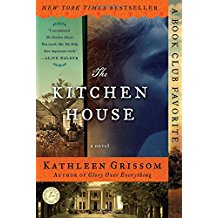In her debut novel, The Kitchen House, author Kathleen Grissom has given us a glimpse of life on a Virginia tobacco plantation in the late 1700s.
When a little red-haired white girl is brought to Tall Oaks, she doesn’t know her own name, nor can she remember anything of her past. Captain Pyke “gives” the child to Belle, a slave, as help in the kitchen house, a building quite removed from the main house. The girl is sickly and constantly in the state of tears. Before Captain Pyke, the master of Tall Oaks and also a ship’s captain, goes back to sea, he casually mentions that the girl’s parents and brother died at sea while on their way to America from Ireland. The traumatized girl learns her name is Lavinia McCarten and that she is seven years old. The Captain explains that he didn’t know what else to do with the girl; he couldn’t just leave her on the dock. By default, she is his property and he keeps her as an indentured servant.
As years pass, Lavinia becomes a part of the household, learns to cook, clean and to serve food. She’s loved by her black family, plays with other slave children and, although she recognizes that she looks different, is content.
The Captain’s wife, Miss Martha, mostly stays in her room in the large, grand mansion, especially when the Captain is at sea. Although she has two living children, she has had several miscarriages, leaving her depressed and dependent upon strong doses of laudanum. When Miss Martha sees Lavinia, she mistakes her for her long deceased little sister, and insists that the girl spend time with her in the “big house.”
As this remarkable story develops, I found myself in a different world, a world of exacting class distinctions and values. The majority of people had no rights, no say in where or how they lived, down to the tiniest detail. Yet, those in bondage showed love and fierce loyalty toward family.
The Kitchen House is a heartbreaking yet hopeful story of class, race, and dignity. I highly recommend it.



I am currently reading The Outlanders by Diana Gabaldon. It takes place 200 years ago in Scotland and is an eye-opener. Until now, I had assumed the British Isles folk believed in some pretty high-falutin ideals—not so. Looks like The Kitchen House will be next on my list.
This was an eye-opener, for sure. We think of slavery as abhorant (which it was), but in that day, it was normal. It’s hard to imagine life without choices. The Outlanders sounds like a book I should read, too. Thanks for your comment.
I have to read this book, it sounds so good. Thanks, Mary, for sharing a review.
It IS good, Irene. It was a book club selection, or I might never have heard of it. I’m been introduced to a lot of books that way, books I no doubt would not have read otherwise.
A lovely review, Mary. I agree that the 1700s was a “different world.” Class distinction and values are two factors during that time of history that mystify and intrigue me these hundreds of years later. I’ll have to put Kathleen Grissom’s “The Kitchen House” on my TBR list.
Thank you, Alice. I’m glad we live in this “current world.” But that’s all they knew, and even then the captain was a decent person, doing what he felt was the right thing.
This is a great story, very involving. I reveals the complexity of race in southern culture without indulging in preaching. For another book with the same qualities, I recommend Sue Monk Kidd’s INVENTION OF WINGS.
Thanks for the comment, Judith. I, too, read The Invention of Wings and loved it. I happened to hear an interview with Sue Monk Kidd on public radio, which then led me to read her book.